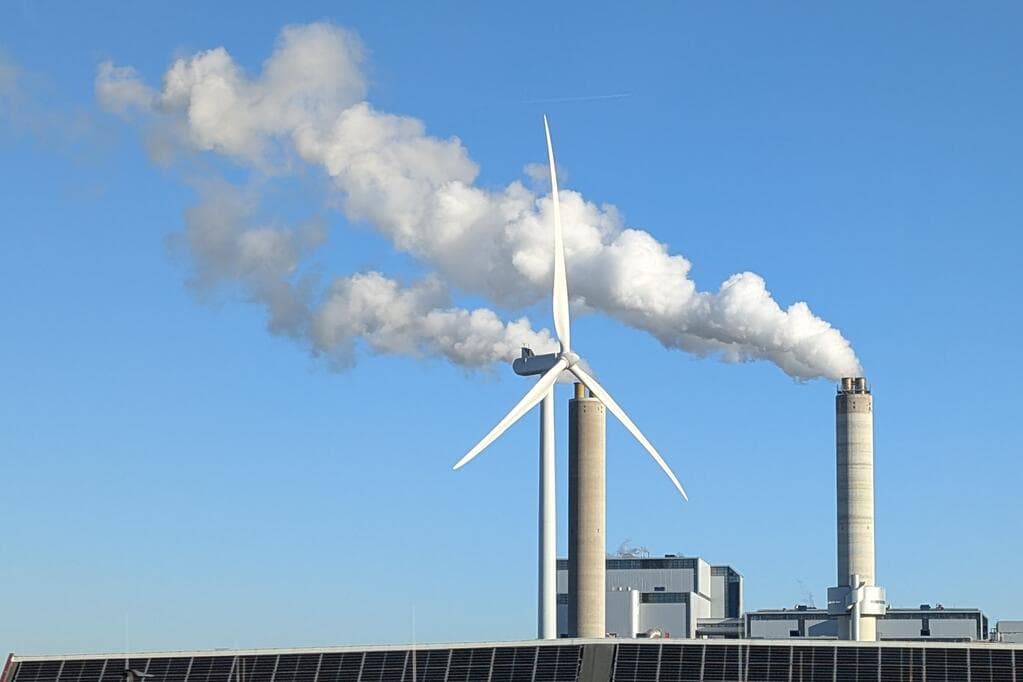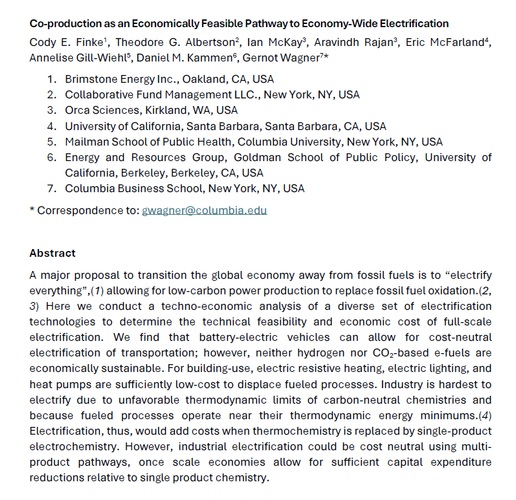Climate and National Security: Bridging the Divide in Energy Policy
During Columbia Business School’s Earth Week, Professors David Schizer and Gernot Wagner explored how climate and national security priorities can accelerate the transition to clean energy.
By Jonathan Sperling
At first glance, energy, climate action, and national security may seem like wholly separate policy fields.
But, as noted during an event at Columbia Business School’s Earth Week, the future of sustainable energy will hinge on finding common ground between these often siloed priorities.
During “Climate & National Security: Finding Common Ground in Energy Policy,” David Schizer, Dean Emeritus of Columbia Law School, and Gernot Wagner, Senior Lecturer at Columbia Business School and Faculty Director of the School’s Climate Knowledge Initiative, offered an exploration of the trade-offs, externalities, and geopolitical tensions embedded in energy policy—and how market-driven solutions could align environmental and security goals.
“Too often, energy policy protects the environment while neglecting national security and vice versa,” Wagner said.
The discussion drew from Schizer’s recent paper, Red, White, and Blue—And Also Green, which argues that U.S. energy policy often prioritizes environmental sustainability or national security—but rarely both. Wagner, a climate economist, offered a complementary perspective focused on innovation, incentives, and global systems change.
Externalities: Beyond Emissions
Energy policy is often discussed in terms of environmental sustainability and cost-efficiency—but as Schizer explained, there are crucial, often-overlooked national security implications. While climate-related externalities like carbon emissions and pollution are well understood, Schizer introduced two additional concepts: defense externalities and funding externalities.
The first occurs when reliance on energy from unstable regions compels military intervention, such as the U.S. decision to defend Kuwait in 1990. The second involves purchasing energy from adversarial regimes, effectively funding their military ambitions. For example, Schizer noted that 45% of Russia’s government revenue prior to the Ukraine invasion came from energy sales.
“Basically, when German consumers were deciding how warm they wanted their living room to be, their decisions had a direct impact on how powerful a military Russia was going to have,” Schizer said.
To reduce these externalities, both Schizer and Wagner emphasized the importance of energy diversification—not only through renewables, but also through domestic fossil fuel sourcing, nuclear energy, and expanded grid resilience. Wagner argued that electrification and on-site renewable energy can enhance national security by reducing dependency on imports and vulnerable supply chains. Schizer also stressed the need for the U.S. to mine critical minerals domestically, even if doing so involves environmental trade-offs.
They agreed that while no energy source is free from geopolitical complications, countries can mitigate risk through thoughtful sourcing, infrastructure investment, and regulatory reform. Ultimately, managing these externalities requires a broader framing of energy policy—one that integrates foreign policy, defense costs, and long-term resilience alongside environmental goals.
Renewable Energy: Promise with Caveats
Renewable energy is often championed as a dual solution to climate change and energy independence—but Wagner and Schizer stressed that its benefits come with limitations. Wagner pointed out that unlike fossil fuels, solar and wind infrastructure provide inherent resilience. Once deployed, these systems operate independently of volatile global supply chains.
“If China stopped exporting tomorrow, the panels and batteries already installed would still work,” Wagner explained. “Unlike with Russia stopping gas deliveries overnight, grandma won’t freeze. That’s a fundamental difference.”
Still, renewable technologies are not immune to geopolitical risks. Key components like polysilicon for solar panels and minerals such as cobalt and lithium are largely sourced from countries with unstable or authoritarian regimes. China dominates the production of many of these materials, and countries like the Democratic Republic of Congo play a critical role in extraction.
“In the same way that the U.S. felt the need to defend Kuwait, would we eventually feel the need to defend Congo for parallel reasons?” Schizer said. A sustainable energy system, he argued, requires not only cleaner sources, but also more transparent, diversified, and ethically resilient supply chains.
Policy Tools: Subsidies, Taxes, and Trade-Offs
The Inflation Reduction Act (IRA) has become a centerpiece of U.S. climate policy, offering wide-ranging subsidies for clean energy technologies. But when it came to how best to shift markets and behaviors, Professors Schizer and Wagner diverged sharply. Wagner made the case for subsidies, highlighting their role in accelerating innovation and expanding access through economies of scale. He emphasized the importance of “learning by doing”—not just for national benefit, but as a global public good.
“We need to subsidize that positive externality,” Wagner said.
He credited early subsidization by Germany and China for bringing solar and battery prices down globally. Schizer, however, warned that subsidies can be inefficient and misaligned with actual outcomes. He advocated instead for a carbon tax—or what he also described as a national security tax—that would let market forces drive more tailored, consumer-driven change.
He illustrated the challenge with electric vehicle policy. While the IRA offers subsidies for EVs, it provides none for hybrids—even though hybrids require far fewer minerals and can dramatically expand resource efficiency. Schizer noted that a Tesla battery is 100 times the size of a Toyota Camry Hybrid’s battery – a missed opportunity.
Pragmatic, But Optimistic
Despite differing views on policy levers, both Wagner and Schizer struck a hopeful tone about the trajectory of the energy transition—if managed wisely. Wagner pointed to Texas as a model of unlikely leadership, where liberalized electricity markets and aggressive investment in wind and solar have driven over 60% of electricity from zero-carbon sources.
For Schizer, success means recognizing trade-offs without letting them become excuses for inaction. He urged policymakers to be pragmatic: to invest in cleaner technologies, manage global dependencies, and build domestic resilience—not from ideology, but from strategic necessity.
First published by Columbia Business School Insights, 25 April 2025.
Event:

"Climate & National Security: Finding Common Ground in Energy Policy"
Tuesday, April 22, 6:00-7:00pm
Join Professors David Schizer and Gernot Wagner for a thought-provoking discussion on the intersection of energy policy, national security, and environmental sustainability.
Drawing from Professor Schizer’s recent work, Red, White, and Blue—And Also Green: How Energy Policy Can Protect Both National Security and the Environment, this conversation will explore strategies to reduce reliance on geopolitically risky energy suppliers, accelerate the transition to clean energy, and balance economic and environmental priorities through market-driven solutions. Don’t miss this opportunity to engage with leading experts on one of today’s most pressing global challenges.
Speakers:
David Schizer, Professor of Law and Economics and Dean Emeritus at Columbia Law School
Gernot Wagner, Senior Lecturer in Economics at Columbia Business School

